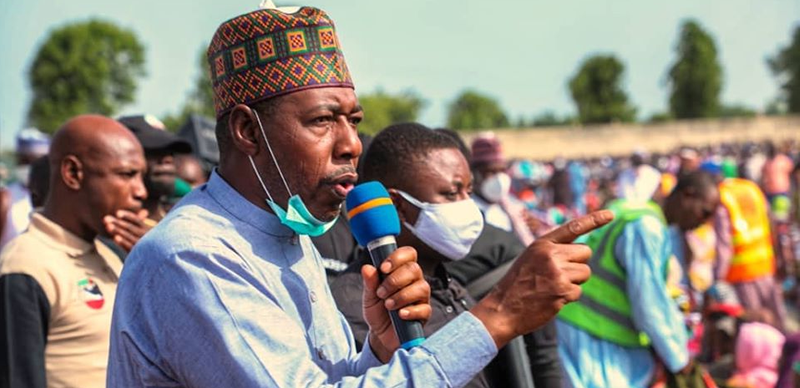Recently the media has been celebrating the increasing number of professors in the Borno State public service. The event that helped to underscore this perception was the swearing-in of the newly constituted state executive council. One of those who took the oath is a professor of medicine who would be the first of that status to preside over the Ministry of Health as its commissioner. He was the Chief Medical Director of the Health Management Board before his appointment. I say: ‘here we go again.’ Readers might recall that in December 2020, when two professors won seats in the local government election, I wrote under the caption, Borno raises the bar:
“When two professors took oath as local government chairmen in Borno State last week they became immediate celebrities, as it is unusual to find persons of their caliber stooping to stand for elections at that lower level. Though Professors Adamu Alooma and Ibrahim Bukar won the contest unopposed in Damboa and Gwoza local governments areas respectively, it did not draw away an inch from the uniqueness of their political foray. It is the first time in Borno and probably in the entire North, thus raising the bar henceforth, far up, for qualifications to such seemingly mundane positions.”
The latest addition would be the seventh professor to come into the government in the last two years. The first professor to be appointed was to the office of the Chief of Staff in July 2020, a pharmacology scholar who had served as commissioner for education creditably for a year. This appointment was followed rapidly by the two professors, who won elections, unopposed, in December of the same year, to chair local government councils. Three other worthy professors were appointed into the public service last year, one to chair the Education Trust Fund, another to become Executive Chairman of the State Universal Basic Education Commission (SUBEC), and the other to serve as Chairman of the Teaching Service Board.
I guess the reason for attracting the professors to the public service would be for the government to benefit from their deep knowledge and adeptness in handling issues that have been adjudged to be of the highest quality by their peers in the university. As some of the brightest stars on the horizon expectations would be high that they would be expected to be quicker to absorb the political and social adroitness that would help them steer the affairs of the large bureaucracies they will come to superintend. I have come across a few of them and interacted at committee levels here and there and I have always come away with good impressions. I guess they must have all been well selected.
Improvement at the top of the public service is always the first step to delivering better services to the public. This first step the government has taken to inject quality staff into cabinet positions is bound to pay good dividends as both the government and the citizens will be assured of quality advice, a thorough educated debate, and when a decision is taken a swifter implementation activity.
Quality advice to the government and swift implementation of decisions are sorely needed in the state, perhaps more than any other in Nigeria, because of the traumas visited on the citizens by the heinous brigandage of the Boko Haram insurgents. In the last many years, infrastructure particularly in most of northern Borno has completely collapsed. The federal and state highways leading up to those areas have been in a state of disrepair for so long rendering many villages and towns inaccessible. Government buildings, offices, schools, water and electricity projects, etc., have all been wantonly destroyed. Trade and commerce have been badly affected. Maiduguri, the state capital has virtually been a garrison city, all the roads leading to it from other Nigerian cities harassed by insurgents. Most of the inhabitants of northern Borno and other affected towns and villages have all made Maiduguri their domicile, albeit in IDP camps dotted within the city.
That is then. Today things are gradually looking up for the state. The insurgents have been degraded a lot, thanks to our gallant troops, though they still retain some agility to hit soft targets, now and then. Some peace has returned all over and has even made it possible for displaced citizens to return to their towns and villages. The IDPs within Maiduguri have almost been emptied. The government is now at a crossroads having to gather all the human and other resources to render much-needed services to traumatized citizens. It is crunch time which probably explains the need for getting the very best available manpower to manage the way forward. In this regard, they have made magnificent strides.
Besides attracting the services of eminent professors, I have also spotted the appointment of a former deputy representative to the United Nations as chairman of the advisory committee on governance and development. There within the government, there is also a former country representative Melinda Gates serving as a close adviser to the governor. There are also sound technocrats brought in from the universities and elsewhere as chief executives manning key parastatals and agencies of government.
One prays that many of these government appointees will remain in the public service and probably gravitate into political hustings that would see them be even more relevant to the public thereafter.

 Join Daily Trust WhatsApp Community For Quick Access To News and Happenings Around You.
Join Daily Trust WhatsApp Community For Quick Access To News and Happenings Around You.


